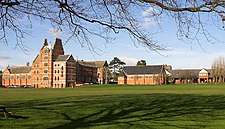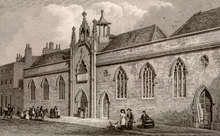Exeter School
Exeter School is a selective independent co-educational day school for pupils between the ages of 7 and 18 in Exeter, Devon, England. In 2019, there were around 200 pupils in the Junior School and 700 in the Senior School.
| Exeter School | |
|---|---|
 | |
| Address | |
Victoria Park Road , , EX2 4NS England | |
| Coordinates | 50°43′10″N 3°30′43″W |
| Information | |
| Type | Independent day school |
| Motto | Classical Greek: ΧΡΥΣΟΣ ΑΡΕΤΗΣ ΟΥΚ ΑΝΤΑΞΙΟΣ - Gold is not worth more than virtue. |
| Established | 1633 |
| Department for Education URN | 113607 Tables |
| Chair of Governors | Andrew King |
| Headmaster | Bob Griffin |
| Gender | Co-educational |
| Age | 7 to 18 |
| Enrollment | 900 |
| Houses | 10 |
| Former pupils | Old Exonians |
| Website | http://www.exeterschool.org.uk/ |
History

The School traces its origins from the opening of the Exeter Free Grammar School on 1 August 1633, attended mainly by the sons of the City freemen. Exeter's wealthy merchants, notably Thomas Walker, provided the finance, with sufficient bequests to pay the Headmaster £50 a year and to install the school in the medieval buildings of St John's Hospital, which had stood on the south side of the High Street since the 12th century.
In 1878 the school opened as Exeter Grammar School at a new campus designed by noted architect William Butterfield.[1] The school occupies this 25-acre (100,000 m2) site on Victoria Park Road to this day. The cost at the time was £7,600 with a further £16,750 spent on the erection of buildings. It was decided that St John's Hospital Trust had to pay to Exeter School the net annual income of all endowments for Exhibitions and Scholarships attached to the School, and it also had to pay a proportion of the residue of its income.
In 1920 the Governors of Exeter School decided that it was no longer possible for them to continue the School without considerable assistance. The Exeter Education Authority agreed to assist but only if the School came under its direct control so, in April 1921, control of the school was handed over to the City. It then became a "maintained" school until 1929 when it became an "aided" school, thus regaining charge of its own finances under a newly appointed Governing Body.[2][3][4]
In March 1945 its status changed again to a direct grant grammar school and remained as such until September 1975 when the scheme was abolished. In September 1976 the first "independent" pupils were admitted into the school.[5]
From 1979, the School participated in the Assisted Places Scheme, taking over 200 pupils at its peak, but this scheme was abolished in 1997 and the last of these pupils left in the summer of 2004.[6] In 1981 the Sixth Form became coeducational. Following the success of the move, girls were admitted to all years in 1997.
The school maintains links with its former pupils through the Old Exonian Club which meets annually around the country. There is an Alumni Office which opened in September 2013. It was set up to develop and foster lifelong relationships between the School and its past pupils and staff.[7]
Academic standards
In March 2014, the Independent Schools Inspectorate reported upon eight areas: the quality of the pupils' achievements and learning; the contribution of curricular and extra-curricular provision; the contribution of teaching; the spiritual, moral, social and cultural development of pupils; the contribution of arrangements for pastoral care; the contribution of arrangements for welfare, health and safety; the quality of governance; and the quality of leadership and management, including links with parents, carers and guardians.
The report concluded that the 7-18 co-educational day school was at the highest level, excellent, in each of the eight areas.
The team of nine reported that "the quality of the pupils' achievements is excellent in their academic work and their activities." The ISI report continues: "Teaching is excellent and promotes high quality learning. The broad curriculum enables pupils to have a wide range of experiences and the extra -curricular provision is extensive. Pupils achieve individual and team successes in a wide range of activities and national competitions. Pupils have an excellent attitude to their work and this makes a significant contribution to their achievement and progress."[8]
The report also commented on the excellent relationships between staff and pupils where learning is seen as a co-operative venture. "Teachers have high expectations of their pupils and pupils feel well supported by staff who offer much help and encouragement beyond the classroom with drop in sessions, academic clubs, work on the intranet and individual support."[8]
In the summer of 2019, Exeter School celebrated another set of very good A Level results with a 100% pass rate. 21% of all grades were A*, four times the national average, and 54% of grades were either A* or A, more than double the national average of 25.2%.[9] 81% of all grades were A*, A or B.[10]
Summer 2019's GCSE results were also excellent; 74% were 9-7 grades, over three times the national average.[11] Of the 118 pupils in Year 11, 67 achieved 8 or more 9-7 grades with 37 pupils scoring ten or more 9-7 grades.[12]
In December 2017, The Sunday Times named Exeter School ‘South-West Independent Secondary School of the Year 2018’. The 25th edition of its annual Schools Guide, Parent Power, awarded the top place to the co-educational independent school, based on its outstanding academic achievements and overall educational provision.[13]
Houses
There are 10 houses:
- Acland
- Buller
- Collins
- Crossing
- Daw
- Dowrich
- Drake
- Goff
- Raleigh
- Townsend
Whilst this allocation is primarily for pastoral care within the school it also allows an Inter House sports programme to run throughout the year in a wide range of sports for pupils of all ages.
Fees
As of September 2019, the day fees are £4,175 per term for the Junior School (including lunch) and £4,675 per term for the senior school.[14] In September 2016, Exeter School launched eight free places in the Senior School and Sixth Form, as a result of donations and legacies from former pupils, in addition to ongoing grants from a local charity.[15]
Notable Old Exonians
- Michael Aron, British Ambassador to Kuwait, Iraq, Libya and Sudan
- Martin J. Ball, Honorary Professor of Linguistics, Bangor University, Wales
- J. P. V. D. Balsdon, historian
- David Bellotti, Liberal Democrat politician and CEO of Brighton & Hove Albion[16]
- John Blackall, physician
- Kevin Brooks, author of young adult fiction[17]
- William Edward Buckley, professor of Anglo-Saxon[18]
- Robin Bush, Time Team historian[19]
- David Collins, inaugural Governor of the Colony of Van Diemens Land (later Tasmania)[20]
- Paul Cosford, Director for Health Protection and Medical Director for Public Health England
- Maurice O'Connor Drury, psychiatrist
- Beattie Edmondson, actress and comedian
- Ella Edmondson, actress/folk singer/songwriter
- General Sir Anthony Farrar-Hockley, soldier[21]
- Major General Charles Dair Farrar-Hockley, soldier[22]
- Matthew Goode, actor
- Desmond Hamill, television journalist
- Sir Ronald Hatton, pomologist
- Matt Hopper, professional rugby union player
- Fred T. Jane, founder of Jane's Information Group[23]
- Georgia King, actor
- Alex Leger, Blue Peter producer and director
- Tim Lewens historian and philosopher of biology and bioethics
- Jack MacBryan test cricketer and Olympic gold medallist (hockey)
- Stevie Morrison, Olympic Dinghy sailor. Represented GB in Beijing and London Olympics sailing a 49er dinghy, with Ben Rhodes
- George Ferris Whidborne Mortimer, English schoolmaster and divine
- Ben Nealon, actor
- Robert Newton, actor
- Charles Arthur Turner, British jurist, Chief Justice of Madras High Court
- Professor Ian Norman, King's College, London.[24]
- David M. Patrick International Organist.
- Harry Pennell, commander of the Terra Nova Expedition and of HMS Queen Mary[25]
- Major Henry Rew, played rugby ten times for England.[26]
- Ben Rhodes, Olympic Dinghy sailor. Represented GB in Beijing and London Olympics sailing a 49er dinghy, with Stevie Morrison
- John Graves Simcoe, first Lieutenant-Governor of Ontario and founder of Toronto
- Professor F. Gordon A. Stone, Chemistry Professor at the University of Bristol and at Baylor University
- Harry Tincknell, Formula Three racing driver
- Sir Harry Veitch, horticulturalist, instrumental in establishing the Chelsea Flower Show
- Henry Vodden, Bishop of Hull
- Harry Weslake, automotive engineer
- Bob Wigley, Chairman Merrill Lynch, Europe, Middle East and Africa[27]
- Ian Williams, Racing yacht helmsman/skipper. Four times winner of World Match Racing Tour.
- George Woodbridge, actor, stage, screen and television
References
- Cherry, Bridget; Nikolaus Pevsner (1991). Devon. New Haven, CT: Yale University Press. p. 407. ISBN 0-300-09596-1.
- Bush, R.J.E. Exeter Free Grammar School, 1633-1809. Trans. Devon. Assoc. 94, (1962)
- Parry, H. Lloyd. The Founding of Exeter School: A History of the Struggle for freedom of Education within the City of Exeter, Exeter and London, (1913)
- "A short history of Princesshay" Archived 3 April 2007 at the Wayback Machine, Exeter Memories
- "Study of Occupational Change", Nuffield College, Oxford, 1972
- "Exeter Middle School's Cup Final", The New Millennium
- "Alumni - Exeter School website".
- "Exeter School :: Independent Schools Inspectorate". www.isi.net.
- "Infographic: A level results, 2019" (PDF). GOV.UK.
- "Academic Outcomes - Exeter School website".
- "Infographic: GCSE results, 2019" (PDF). GOV.UK.
- "Academic Outcomes - Exeter School website".
- "Exeter School named South-West independent school of the year - Exeter School website".
- "Fees and Terms & Conditions Academic Year 2019 - 2020".
- "Scholarships and Bursaries - Exeter School website".
- "David Bellotti, Liberal Democrat MP - obituary". 15 June 2015 – via www.telegraph.co.uk.
- "The Bunker Diary: Exeter author Kevin Brooks wins children's book prize". Express & Echo. 23 June 2014. Archived from the original on 14 July 2014. Retrieved 30 June 2014.
- Frederic Boase, Modern English Biography, vol. 4 (Netherton and Worth, 1906), p. 2,007
- Channel 4, Time Team - Meet the Team - Robin Bush, accessed 7 October 2008
- "Collins, David (1754-1810)", Project Gutenburg of Australia
- "Obituary - General Sir Anthony Farrar-Hockley", The Guardian, 15 March 2006
- Who's Who 2006
- "A wealth of knowledge", The Guardian, 31 October 2001
- Ian Norman
- "Harry Pennell collection" Archived 17 July 2012 at Archive.today, Archives Hub
- Henry Rew
- The Guardian, Bob Wigley: A dream come true for the boy inspired by business, 17 November 2006
External links
- Official site
- Old Exonian Club
- Profile on the ISC website